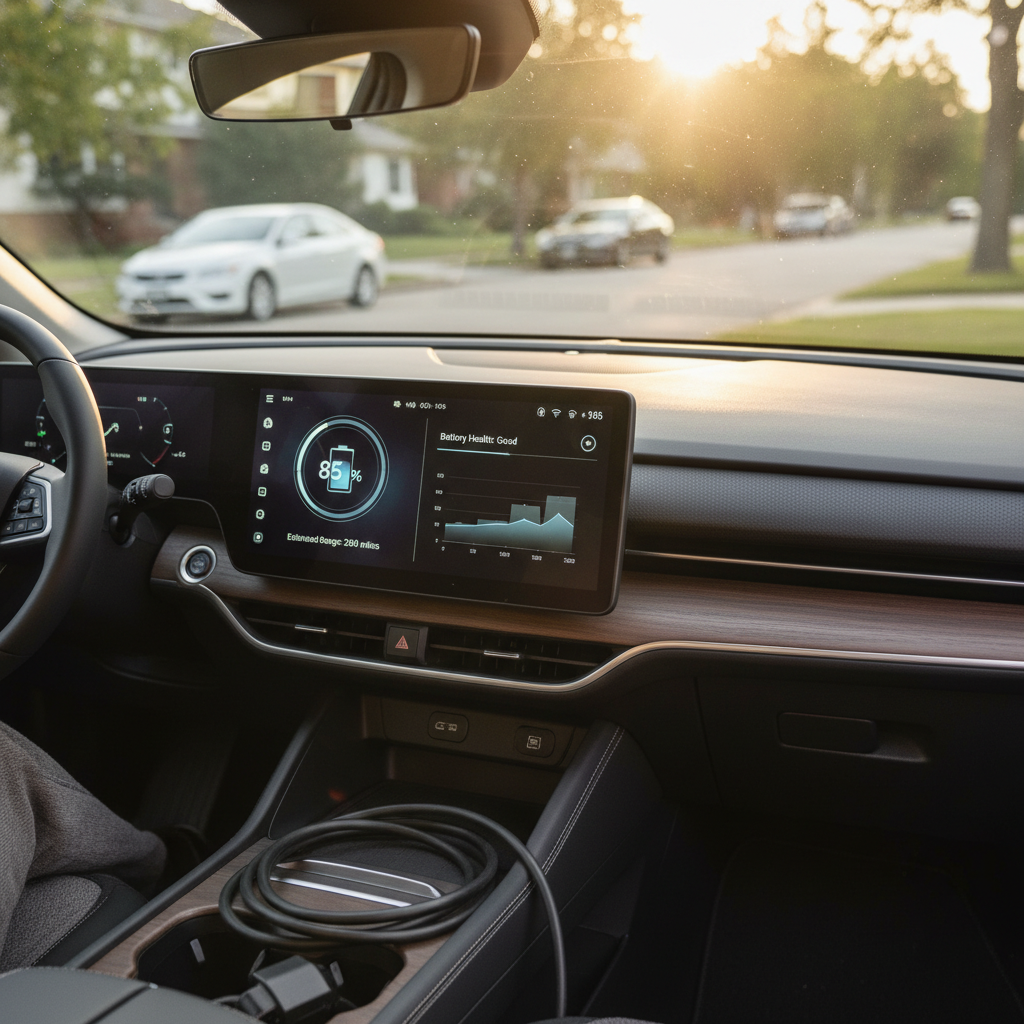If you need a hardworking pickup but wince at new‑truck prices, CPO trucks, certified pre‑owned pickups, can look like the Goldilocks option. They promise used‑truck savings with new‑truck peace of mind. The trick is knowing what “certified” really buys you, where the value is, and when you’re better off with a plain used truck or even a new lease, especially as electric trucks enter the mix.
Quick definition
Why CPO trucks are so popular right now
Pickup trucks are expensive to buy new, and they hold their value stubbornly well. A lot of buyers are discovering that a two‑ or three‑year‑old certified pre‑owned truck gives them the towing, tech, and comfort they want without committing to a massive new‑truck payment or the unknowns of a high‑mileage beater.
What you can expect when you shop CPO trucks
Why this matters to you
What “certified pre-owned” truck really means
Not every truck wearing a “certified” sticker is the same. There’s a hard line between a manufacturer CPO truck and a dealer-certified used truck. The difference affects where you can get warranty work done, how long the coverage lasts, and how much confidence you should have in the inspection checklist.
Two very different kinds of “certified”
Know which one you’re looking at before you fall in love with a truck.
Manufacturer CPO truck
Backed by the brand, Ford, Chevy, Ram, Toyota, etc., and serviced at any franchised dealer, nationwide.
- Strict age/mileage limits
- Factory multi‑point inspection
- Manufacturer warranty extensions
- Often includes roadside assistance and loaner coverage
This is what most people mean when they talk about CPO trucks.
Dealer “certified” truck
Certified only by the selling dealership, not the automaker.
- Warranty may be limited to that store or group
- Coverage can disappear if the dealer closes
- Inspection standards vary a lot
There are good dealer programs out there, but read the fine print carefully, and don’t assume it’s equivalent to a factory CPO.
Watch the logo on the window sticker
How CPO truck inspections actually work
Every truck that earns CPO status has to pass a multi‑point inspection, but that phrase gets abused. What matters are the details: how many items are checked, who’s doing the work, and whether wear‑and‑tear parts are replaced or just noted. With trucks, that list needs to cover towing, frame integrity, and off‑road abuse, not just whether the seat heaters work.

- History check: Pulling a vehicle history report to weed out branded titles, flood vehicles, and serious accident damage.
- Exterior and frame: Inspecting bed, frame rails, hitch, and underbody for rust, repairs, or signs of overloading and off‑road abuse.
- Powertrain: Checking for leaks, abnormal noises, transmission behavior, 4x4 system operation, and differential condition.
- Suspension and brakes: Ensuring shocks, bushings, steering components, and brake hardware can stand up to work‑truck duty.
- Electrical and safety systems: Verifying airbags, ABS, driver‑assist systems, lights, and trailer‑brake wiring.
- Fluids and maintenance: Confirming maintenance intervals have been followed; updating fluids, filters, and wear items as required by the program.
Ask for the checklist
Typical CPO truck warranties and perks
Warranties are where CPO trucks earn their keep. Most factory programs stack new coverage on top of whatever’s left from when the truck was sold new. The details vary by brand, but the patterns are similar: extended powertrain protection, a shorter bumper‑to‑bumper style warranty, and roadside assistance baked in.
Examples of mainstream truck CPO coverage
Exact terms change over time and by trim, but this gives you a feel for how major truck brands structure their CPO warranties.
| Brand/program example | Powertrain warranty (from in‑service date) | Comprehensive warranty | Extras often included |
|---|---|---|---|
| Chevrolet/GMC CPO trucks | Up to 6 years / 100,000 miles | 12 months / 12,000 miles | Roadside assistance, courtesy transportation, scheduled maintenance visits |
| Ram Certified Pre‑Owned | 7 years / 100,000 miles | 3 months / 3,000 miles | 24/7 roadside assistance, towing, rental allowance, satellite‑radio trial |
| Ford CPO (typical truck) | Up to 7 years / 100,000 miles | 12 months / 12,000 miles | Roadside assistance, optional extended coverage, low‑mileage requirements |
Always verify current coverage on the specific truck you’re considering, don’t rely on generic program descriptions alone.
What these warranties really buy you
CPO trucks vs regular used vs brand‑new
When you strip away the marketing, your choice is simple: pay more for brand‑new, roll the dice on a standard used truck, or split the difference with a CPO pickup. The right answer depends on how long you’ll keep it, how hard you work it, and how much risk you can live with.
Brand‑new truck
- Full factory bumper‑to‑bumper and powertrain warranties
- Latest tech, safety, and towing features
- Highest price and steepest first‑year depreciation
- Best if you tow heavy, keep it 8–10 years, or write it off for business
CPO truck
- 2–4 years old, lower miles, fully inspected
- Extended powertrain + limited comprehensive coverage
- Price typically 10–25% below new for similar trim
- Sweet spot if you want modern tech with real warranty backing
Regular used truck
- Widest range of years, miles, and prices
- Little or no factory warranty left
- Best for tight budgets or project trucks
- Inspection on you, pay for a pre‑purchase check by a trusted mechanic
The “almost‑CPO” trap
CPO electric trucks and battery coverage
Electric pickups like the Ford F‑150 Lightning, Rivian R1T, and Silverado EV are starting to appear on used‑truck lots, and some are entering CPO programs. With a CPO electric truck, the usual rules still apply, inspection, warranty, roadside assistance, but the heart of the deal is the battery and high‑voltage hardware.
- Battery warranties are already long. Most electric trucks ship with 8‑year, 100,000‑mile (or better) battery and electric‑drive warranties from the factory. A CPO program may extend or echo that coverage, but it usually doesn’t replace it.
- CPO adds confidence on everything around the battery. Suspension, steering, body hardware, infotainment, and charging ports should all be inspected and covered similarly to a gas truck.
- Real‑world range matters. Payload, trailers, cold weather, and big tires hit EV truck range hard. On a test drive, steady‑state range and energy use (kWh/100 miles or mi/kWh) tell you more than the original EPA sticker ever will.
Where Recharged fits in
Who should (and shouldn’t) buy a CPO truck
CPO trucks aren’t automatically “best” for everyone. They shine for buyers who work their trucks hard but don’t want the sting of a brand‑new payment, or the gamble of a high‑mile auction special.
Is a CPO truck a good fit for you?
Match your situation to the column that sounds most like your life.
CPO trucks are a strong fit if you…
- Want a late‑model pickup with modern safety and towing tech
- Put serious miles on your truck each year
- Hate surprise repair bills and want warranty coverage
- Can spend a bit more than rock‑bottom used pricing
- Plan to keep the truck at least 3–6 years
You may skip CPO and go used/new if you…
- Just need a cheap runabout or occasional Home Depot hauler
- Enjoy doing your own repairs or upgrades
- Qualify for aggressive incentives or fleet deals on new trucks
- Need a very specific configuration that’s rare in CPO inventories
How to shop smart for a CPO truck
A CPO badge is a good start, not a substitute for common sense. The smartest CPO truck buyers treat the program like one more tool in their belt: useful, but not magic. Here’s a simple checklist to keep you out of trouble.
CPO truck buying checklist
1. Decide how you’ll really use the truck
Be brutally honest about towing, payload, and off‑road use. There’s no point paying for a max‑tow diesel if you never pull more than a pair of jet skis.
2. Cross‑shop CPO vs new incentives
Before you sign anything, compare the CPO out‑the‑door price to any current rebates, low‑APR offers, or lease specials on a new truck. Sometimes the math surprises people.
3. Demand the full inspection report
Read the CPO checklist line by line. Ask what was replaced, what was “borderline but passed,” and whether you can see the old parts if they’re still on site.
4. Check the tires, brakes, and hitch yourself
Those big, boring wear items add up on trucks. If the tires are nearly done or the rotors are grooved, negotiate to have them replaced or reflect it in the price.
5. Drive it like you already own it
On the test drive, tow or haul if the dealer allows it. At minimum, mix highway, stop‑and‑go, and rough pavement. Listen for clunks, vibrations, and wind noise.
6. Verify that the VIN is actually enrolled in CPO
Ask the salesperson to pull up the truck’s VIN in the factory system so you can see the CPO registration and warranty dates. Don’t just take their word for it.
Shopping online? Lean into the tools
Financing a CPO truck in 2025
Another advantage of CPO trucks is that lenders and captive finance arms tend to like them. Clean history, low miles, and factory backing make them lower‑risk than random used trucks, so rates and terms can be surprisingly close to what you’d see on new models, sometimes better than financing a high‑mile used truck from an independent lot.
How lenders see CPO trucks
- Lower risk of major early repairs thanks to inspection and warranty
- Predictable collateral value compared with rough‑use work trucks
- Often eligible for promotional APRs from the manufacturer
This can turn a CPO truck into a monthly‑payment sweet spot versus both new and older used models.
How Recharged can help with EV trucks
- Online pre‑qualification with no impact to your credit
- EV‑savvy specialists who understand both truck use and charging needs
- Nationwide delivery and trade‑in options so you can swap your current truck without a dealer dance
If you’re looking at a used electric pickup, pairing transparent battery diagnostics with the right loan structure keeps your payment and range expectations in sync.
CPO truck FAQ
Frequently asked questions about CPO trucks
Bottom line: are CPO trucks worth it?
If you want a modern pickup that can work hard without putting your savings at risk, CPO trucks hit a very appealing middle ground. You avoid the nastiest early depreciation of a brand‑new truck while still getting low miles, a documented inspection, and real warranty coverage. For shoppers who haul, tow, or simply keep trucks a long time, that’s a combination that’s hard to beat.
The key is to treat “certified” as a starting point, not a finish line: verify that it’s a true factory CPO truck, read the warranty fine print, and look at the inspection paperwork with a critical eye. And if you’re leaning toward an electric pickup, make sure battery health is front and center in the conversation. That’s exactly where a data‑driven partner like Recharged can help, combining fair pricing, transparent reports, expert EV guidance, and flexible financing so the truck you bring home is the right tool for the job today and ten years from now.



